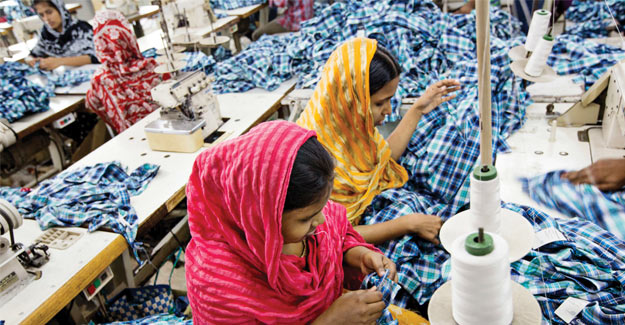Bangladesh Textile Workers Protest New Minimum Wage Announcement
Bangladesh Textile Workers Protest New Minimum Wage Announcement

Bangladeshi textile and garment factory workers are protesting against the government's new minimum wage offer for workers in the key economic sector. The government has fixed the total minimum wage for textile workers at 8,000 taka ($95), up from the existing 5,250 taka, which the authorities said would come into effect in December.
Workers' unions had demanded 16,000 taka as monthly minimum wage in line with the workers' demand and market prices. "We demanded 16,000 taka as minimum wage two years ago. In the meantime, the living costs got even higher. The announcement of 8,000 taka is an inhuman, unfair and deceptive behaviour for the workers," Joly Talukder, the General Secretary of the Garment Workers' Trade Union Centre said.
"This government is owner-friendly government. The new minimum wage is a gift for the owners from the government. We cannot accept it under any circumstances," she said. Anajan Das, the President of the Bangladesh Garments Workers Unity warned the government that it would have to bear the responsibility if the situation got out of their hands after the announcement of the new wage. "It is impossible to make a living with the wage of 8,000 taka. We hatefully reject this new wage," he said.
The government in January created a panel headed by a retired judge to review the minimum wage for the sector, which was last fixed at 5,250 taka on November 1.
The Bangladesh Garment Manufacturers and Exporters Association advocated fixing the new wage at 6,250 taka, while the representatives of the workers proposed raising it to 12,000.
The textile sector has faced intense scrutiny for years because of its working conditions, especially after the collapse of the Rana Plaza complex in 2013, in which 1,100 workers died and 2,500 were injured.
In fiscal year 2017-2018, Bangladesh exported textile products worth US$ 30.6 billion, which represented more than 83% of its total exports, which in that period reached US$ 36.6 billion.
Clean Clothes urges brands to oppose Bangladesh minimum wage
The newly announced minimum wage for Bangladeshi garment workers has been branded outrageous by Clean Clothes Campaign. The NGO is now calling on apparel brands to oppose the new wage of US$ 95 per month which, it claims, is nowhere near a living wage. "Brands and their associations have repeatedly expressed support for a living wage and for fair negotiations involving legitimate trade unions, so they cannot possibly approve of an 8,000 taka minimum wage nor of this process, both of which are strongly rejected by workers' legitimate representatives," said Ineke Zeldenrust of Clean Clothes.
"The declaration of minimum wage of 8,000 taka totally failed to fulfill the expectations of the workers and workers' organisations," said Shapon Salauddin, the secretary general of the IndustriALL Bangladesh Council (IBC). Clean Clothes Campaign said it supports the IBC's call for a review of the announced amount, in light of the demand of workers' unions for the new minimum wage to be set at 16,000 taka, and, "due to serious concerns about the wage board composition and process.
Added Ineke Zeldenrust: "The 8,000 taka as a new minimum wage is outrageous. As we have done all along, we are fully backing the demand for 16,000 taka that the IBC had clearly communicated to the Minimum Wage Board, and support them in requesting an immediate review given that the wage board process was deeply compromised."
Factory owners claim wage hike will erode competitiveness
Bangladesh's garment exporters claim that the hike in minimum wages will erode competitiveness of the sector, and increase the cost of doing business. This is even as the sector is getting more orders following the US-China trade war, and a reduction in US cotton prices.
According to Bangladesh industry associations, cost of doing business has been rising over the years, but apparel price realisations have not increased commensurately. Of course, the various government policies to support the industry have helped mitigate some of the increase in costs.
The BGMEA has gone further to warn of factory closures due to the wage hike. To overcome such a situation, garmenters have demanded more sops from the government, including export-friendly exchange rates, to ensure expansion of the industry, and consequent employment generation. The wage hike could lead to further automation in the industry.
Many factories have been forced to close down their business in the face of growing challenges and the number of active BGMEA member factories came down to 3,000 from 7000 in recent years.
The industry associations have thus opposed the labour unions' demand of Tk 16000 per month as minimum wages, terming it illogical. BGMEA leaders have also asked buyers to take their share of the responsibility, so the industry can pay its workers better, living wages.



 textileexcellence
textileexcellence 







